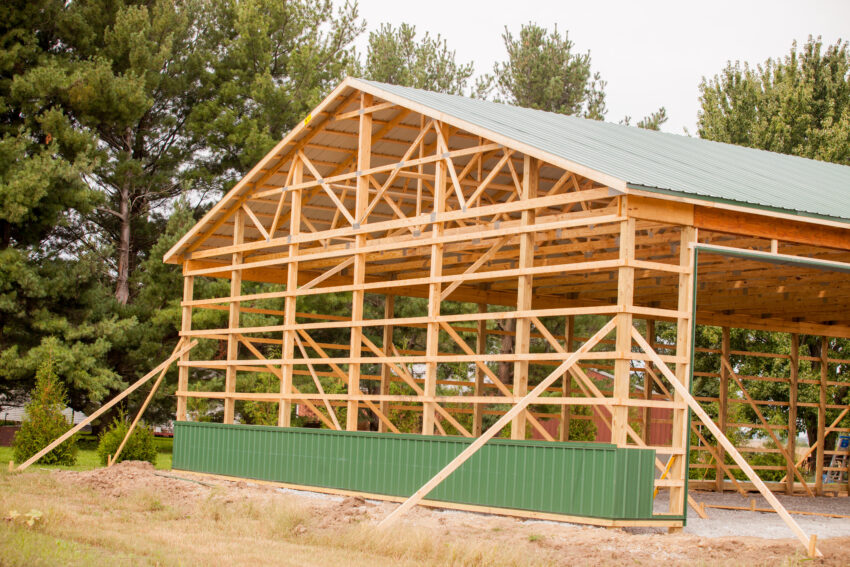Table of Contents
Amish craftsmanship is renowned for its attention to detail, quality materials, and time-honored building techniques. When it comes to pole barns, many homeowners and businesses turn to Amish builders for their reputation for durability and aesthetic appeal. An Amish build pole barns seamlessly combines practicality with craftsmanship, offering a versatile structure that can serve as storage, a workshop, animal shelter, or even a living space. Here’s what you need to know about choosing an Amish-built pole barn and why these structures stand the test of time.
1. Time-Honored Construction Techniques
Traditional Amish pole barns are constructed using post-frame techniques that date back generations. Key features include:
- Massive Timber Posts: Set deep into the ground, these posts form the barn’s skeleton, providing excellent stability and resistance to wind and snow loads.
- Heavy-Duty Trusses: Usually crafted on-site, roof trusses are designed to span wide areas without internal supports, creating clear, open interiors.
- Thoughtful Joinery: Mortise-and-tenon or pegged connections ensure tight, long-lasting joints that eliminate the need for metal fasteners prone to rust.
- Hand-Finished Details: Interior elements like loft beams, trim, and doors often feature smooth finishes and precise fit, reflecting the builder’s pride in their work.
These techniques result in a structure that can withstand decades of wear with minimal maintenance.
2. Quality Materials
Amish builders carefully select materials for strength and longevity:
- Pressure-Treated Posts: Cedar or fir posts treated to resist rot and insects.
- Grade-A Lumber: High-quality, sustainably harvested timbers for framing.
- Metal Roofing and Siding: Galvanized or Galvalume panels with protective coatings to resist corrosion and fading.
- High-Grade Fasteners: Stainless steel or coated nails and screws that maintain holding power over time.
By investing in premium materials, Amish pole barns require fewer repairs and retain their value over the long term.
3. Customizable Design Options
One of the greatest advantages of Amish-built pole barns is their customizability. Builders work closely with clients to tailor every aspect:
- Dimensions and Footprint: From modest 20×20 utility sheds to expansive 50×100 workshops, sizes can be adjusted to fit available land and intended use.
- Roof Styles: Gable, gambrel (barn-style), or monitor roof profiles, each with its own aesthetic and functional benefits.
- Door and Window Placement: Sliding barn doors, roll-up garage doors, walk-in man doors, and strategically located windows for natural light and ventilation.
- Lofts and Mezzanines: Interior lofts can provide additional storage without expanding the barn’s footprint, ideal for hay storage or equipment.
Amish builders value collaboration, ensuring the final design reflects your vision and practical requirements.
4. Cost-Effectiveness and Value
While Amish craftsmanship can carry a premium, pole barns are inherently cost-effective compared to traditional stick-frame construction:
- Faster Build Times: Pole barns typically require fewer site preparations and can be erected quickly—sometimes within a week for smaller structures—reducing labor costs.
- Reduced Foundation Expenses: Standard pole barns use concrete or treated wood posts instead of full concrete slabs, lowering foundation costs.
- Energy Efficiency: Ample space for insulation and custom venting options help regulate interior temperature, reducing heating and cooling costs.
The durability and low maintenance needs of Amish-built pole barns often result in a lower total cost of ownership over decades.
5. Versatile Applications
Amish pole barns can serve multiple functions:
- Agricultural Use: Livestock shelters, hay storage, machinery sheds, and grain storage.
- Workshops and Garages: Space for woodworking shops, automotive repair, and equipment maintenance.
- Commercial Spaces: Warehouse storage, retail showrooms, and artisan studios.
- Recreational Buildings: Home gyms, hobby or craft studios, and event venues.
- Residential Additions: Detached garages, pool houses, or even guest cottages with proper insulation and finishing.
Their adaptability makes pole barns a wise investment for both residential and commercial property owners.
6. Maintenance and Longevity
Amish-built pole barns are designed for low upkeep:
- Metal Roof Care: Occasional cleaning and inspection for loose fasteners keep the roof watertight.
- Wood Preservation: Touch-up of exposed wood posts or trim with stain or paint as needed protects against weathering.
- Gutter and Drainage: Properly installed gutters and grading around posts prevent water pooling and wood deterioration.
- Regular Inspections: Seasonal checks for animal nests, rot, or damage ensure small issues don’t become major repairs.
With routine care, an Amish-built pole barn can last 50 years or more, delivering decades of reliable use.
7. Selecting the Right Amish Builder
Choosing the right Amish contractor is essential for a successful project. Keep these factors in mind:
- Experience and Reputation: Look for builders with a proven track record and testimonials from satisfied clients. Local references can provide insights into workmanship and reliability.
- Detailed Quotes: Obtain written proposals that outline materials, labor, timelines, and payment schedules. Transparency prevents surprises.
- Warranty and Support: While Amish builders often rely on craftsmanship warranties, ensure there is a clear agreement on any post-construction support or adjustments.
- Communication: Even though some Amish communities limit electronics, reputable builders arrange face-to-face meetings, sketches, and written contracts to maintain clear communication.
A thorough vetting process ensures you select a builder whose values align with your expectations.
8. Embracing Amish Craftsmanship
When you choose an Amish-built pole barn, you’re investing in more than just a structure—you’re embracing a tradition of quality, integrity, and community. Amish builders take pride in their work and often view each project as an extension of their heritage. The result is a timeless barn that stands as a testament to meticulous craftsmanship and functional design.
Conclusion
From rugged agricultural outbuildings to sophisticated workshop spaces, Amish-built pole barns offer unmatched quality, durability, and versatility. By leveraging time-honored construction techniques, premium materials, and personalized design, these barns provide exceptional value and long-term performance. If you’re planning a pole barn project in your area, consider partnering with an experienced Amish builder to create a structure that fulfills your needs and stands the test of time.

